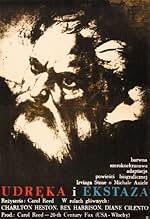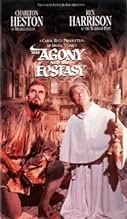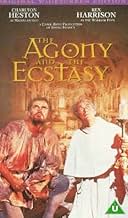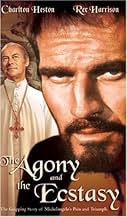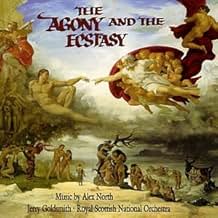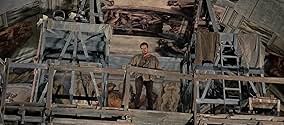NOTE IMDb
7,2/10
8,3 k
MA NOTE
Michel-Ange est chargé par le pape Jules II de peindre les fresques du plafond de la Chapelle Sixtine. Le peintre génial supporte mal le comportement despotique du pape. L'affrontement entre... Tout lireMichel-Ange est chargé par le pape Jules II de peindre les fresques du plafond de la Chapelle Sixtine. Le peintre génial supporte mal le comportement despotique du pape. L'affrontement entre les deux grands hommes est inévitable.Michel-Ange est chargé par le pape Jules II de peindre les fresques du plafond de la Chapelle Sixtine. Le peintre génial supporte mal le comportement despotique du pape. L'affrontement entre les deux grands hommes est inévitable.
- Nommé pour 5 Oscars
- 3 victoires et 9 nominations au total
Fortunato Arena
- Pope's Bodyguard
- (non crédité)
Lars Bloch
- Baron Von Silenen
- (non crédité)
Angelo Boscariol
- Papal Guard
- (non crédité)
Calisto Calisti
- Physician
- (non crédité)
Amerigo Castrighella
- Quarry cart assistant
- (non crédité)
Anita Ceccotti
- Woman Under the Chapel
- (non crédité)
Enrico Chiappafreddo
- Tavern Customer
- (non crédité)
Histoire
Le saviez-vous
- AnecdotesThe book on which this movie is based covers the entire life of Michelangelo Buonarroti. This movie based on a single chapter. One of the shortest, if not the shortest, in the entire book.
- GaffesAs shown in the movie, Michelangelo created a flat wooden platform on brackets built out from holes in the wall, high up near the top of the windows. But contrary to what is depicted in the film, he did not lie on this scaffolding while he painted, but painted from a standing position.
- ConnexionsEdited from Prologue: The Artist Who Did Not Want to Paint (1965)
Commentaire à la une
When you think about it, making a movie about artistry is pretty hard. Painting, writing, sculpting, music, whatever, it's not easy to make the act very interesting--painting is painstaking, it takes a long time. But in this movie, they succeed. Not just making a movie, but making an epic, a massive movie out of an act of creation, is a tough thing to do. But they really do succeed. At the heart of the movie isn't really the act of creation, or the passion for it, or even the ceiling itself--it's the adversarial relationship between Rex Harrison (Pope Julius II) and Charlton Heston (Michaelangelo).
It's certainly not that passion and creation are not here, it's just that they enrich the story about two men and their relationship. When Julius comes into the chapel in the middle of the night, and Michaelangelo is invariably there, there's a bond, even with silent incipient tension.
Heston is of course the only person for this role, as epics go, he's the best. For some reason he manages not to be overcome by the massive scale of these sorts of movies--something that happens to almost everyone else (look at Sinatra and Cary Grant in "the Pride and the Passion", they are totally lost in the grande scale, and they're the incomparable Grant and the larger than life Sinatra, not much more to be said there). Heston makes a solid tortured artist and Rex Harrison is quite wonderful as the Pope. He communicates the strength and intelligence of a Pope who loves art but must go to battle to preserve all that he holds dear. There's a scene when the Pope wants people to see the half completed chapel, since he has grown impatient with the time and when Michaelangelo bitterly objects, Harrison explodes with anger--extremely effective. When Harrison passed, it was truly a loss to movies.
There are flaws, no question, and it's not Heston's best work, course, once you've done Ben Hur and the Ten Commandments, nothing else is going to be your best work. The subplot with the sort of love interest is pretty silly, and it goes on a bit too long. The earnestness of the faith in the church, the sincerity of Heston when he says "Holiness" to the pope, a man that drives him crazy, is poignant. His faith is deep, almost as if he derives his love of art from a love of God. There are even some nice moments of levity as when a spattered Michaelangelo spits out a gob of paint and it lands near a watching Julius; or when the Pope creates a cardinal out of teen for payment in order to keep up the painting.
When it comes to big movies, this definitely lays with a handful of others that will never be surpassed--Titanic tried to be this kind of movie, and proves that even with $200 million and all the nifty gizmos of the modern age, it's very difficult to do; c'mon, Rex Harrison and Charlton Heston compared to Leo DeCaprio and Billy Zane--not much of a contest there.
See the movie, forgive it its flaws and appreciate the richness and nuance of the relationship between Pope and Artist.
It's certainly not that passion and creation are not here, it's just that they enrich the story about two men and their relationship. When Julius comes into the chapel in the middle of the night, and Michaelangelo is invariably there, there's a bond, even with silent incipient tension.
Heston is of course the only person for this role, as epics go, he's the best. For some reason he manages not to be overcome by the massive scale of these sorts of movies--something that happens to almost everyone else (look at Sinatra and Cary Grant in "the Pride and the Passion", they are totally lost in the grande scale, and they're the incomparable Grant and the larger than life Sinatra, not much more to be said there). Heston makes a solid tortured artist and Rex Harrison is quite wonderful as the Pope. He communicates the strength and intelligence of a Pope who loves art but must go to battle to preserve all that he holds dear. There's a scene when the Pope wants people to see the half completed chapel, since he has grown impatient with the time and when Michaelangelo bitterly objects, Harrison explodes with anger--extremely effective. When Harrison passed, it was truly a loss to movies.
There are flaws, no question, and it's not Heston's best work, course, once you've done Ben Hur and the Ten Commandments, nothing else is going to be your best work. The subplot with the sort of love interest is pretty silly, and it goes on a bit too long. The earnestness of the faith in the church, the sincerity of Heston when he says "Holiness" to the pope, a man that drives him crazy, is poignant. His faith is deep, almost as if he derives his love of art from a love of God. There are even some nice moments of levity as when a spattered Michaelangelo spits out a gob of paint and it lands near a watching Julius; or when the Pope creates a cardinal out of teen for payment in order to keep up the painting.
When it comes to big movies, this definitely lays with a handful of others that will never be surpassed--Titanic tried to be this kind of movie, and proves that even with $200 million and all the nifty gizmos of the modern age, it's very difficult to do; c'mon, Rex Harrison and Charlton Heston compared to Leo DeCaprio and Billy Zane--not much of a contest there.
See the movie, forgive it its flaws and appreciate the richness and nuance of the relationship between Pope and Artist.
Meilleurs choix
Connectez-vous pour évaluer et suivre la liste de favoris afin de recevoir des recommandations personnalisées
- How long is The Agony and the Ecstasy?Alimenté par Alexa
Détails
Box-office
- Budget
- 10 000 000 $US (estimé)
- Durée2 heures 18 minutes
- Couleur
- Rapport de forme
- 2.20 : 1
Contribuer à cette page
Suggérer une modification ou ajouter du contenu manquant

Lacune principale
What is the Japanese language plot outline for L'extase et l'agonie (1965)?
Répondre

